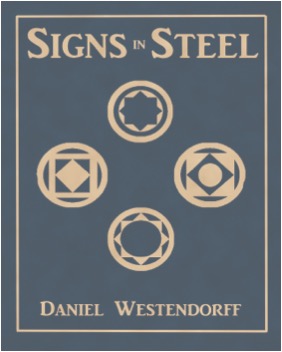My guest today is Danny Westendorff, author of Signs in Steel.
 Danny has always wanted to be a published author. He developed a love for fantasy at an early age, reading novels like Redwall and Harry Potter. This fervor deepened over the years with more reading, studying mythologies from all different cultures, and from playing Dungeons & Dragons and role-playing video games. His world crafting reflects his many passions, departing from the traditional kings-dragons-and-wizards formula of fantasy and transporting to a world filled with strange monsters, creative magical technology, and mysterious lands.
Danny has always wanted to be a published author. He developed a love for fantasy at an early age, reading novels like Redwall and Harry Potter. This fervor deepened over the years with more reading, studying mythologies from all different cultures, and from playing Dungeons & Dragons and role-playing video games. His world crafting reflects his many passions, departing from the traditional kings-dragons-and-wizards formula of fantasy and transporting to a world filled with strange monsters, creative magical technology, and mysterious lands.
Signs in Steel is a labor of love that Danny has posted on Inkshares in the hopes of realizing his dream.
Here now are Danny’s insights on world building.
What is the appeal of world building to you? How does it compare to the importance of character and plot?
First of all, fantasy is the greatest genre out there. It can be literally anything that the author can dream up, and I feel like an important part of the potential of fantasy is that it can have hitherto unseen creatures and cultures. Personally, I think that characters and plot are probably more important than world building, but only because they’re necessary to drive the story. World building takes a close third because it’s very literally wonderful (full of wonder). A well developed world is immersive and gives readers a whole new plane to explore.
Have you learned tips on world building from other authors in your genre? If so, what are they?
I try to take my cues from Brandon Sanderson. For me, The Way of Kings was an academic pursuit, and I was constantly returning to the prelude and prologue to try to answer my questions before he did (he still managed to get me, though). I digress, what I learned from reading Sanderson’s works (Mistborn trilogies, too) is that the key to building worlds is to understand the way that your fantastic elements will impact the world and the way humans will have evolved. I’m not quite as good at science as he is, so I take a little bit more liberties with my world-building elements, letting magic do most of the talking, but I think that a little magical liberties is part of what makes fantasy fantasy.
What are some fundamental rules to world building you would say are important to every writer in the fantasy genre?
Find something that makes your world unique. The more unique elements your story has, the more memorable it is. I’ll never forget E. E. Knight’s Age of Fire hexilogy (not a word) because, even though it’s a fantasy world of swords, horses, elves, and dwarves, the stories are told from the point of view of dragons, something that I had not seen before.
In your opinion, what is it that makes a believable and immersive world for a fantasy story?
Part of the appeal to fantasy is that it is a departure from reality, that it relies on and feeds the imagination of both the author and the reader. Another draw for world-building and fantasy is that it gives authors and readers a chance to breathe life into amazing settings and peoples that don’t get the chance in the real world. That being said, the words “believable” and “fantasy” don’t usually play nice. I think that the most important element to making a fantasy world that’s synergistic is the way that the characters react and handle the world-building elements. If you have a culture of people that live on floating islands, it’s important to create a way for them to thrive. Maybe they developed ways to draw water out of clouds and eat “bearons” (bear-herons that yield both poultry and warm pelts to survive the cold of the high altitude). The point behind my ridiculous example is that it’s important to make considerations of the way that amazing fantasy elements affect human life.
Describe your world and some of the considerations behind it that you feel give your stories a solid sense of realism:
Many of the settings in Signs in Steel are a sort of love note to classic Final Fantasy entries (like V) with countries themed after their respective elements, along with other locales that are still magical, though less strongly defined by elements. This was always a trope that I enjoyed in the classic games and other times it was implemented (like in Avatar: The Last Airbender to name another example). As for creatures, I try to fill my world with interesting beasts and monsters of my own design, but I also studied various mythologies around the world to add to my bestiary.
What tips do you have for aspiring fantasy writers on how to create a solid, believable world?
The only tips I would give to anyone trying to create a world would be just to think about it. This doesn’t even apply just to world building. I use it for everything. I think about my characters and my worlds constantly, letting the ideas tumble around in my head until something sticks. When I find something I like I get my phone out and jot it down so the idea can’t get away from me. If I decide I don’t like the idea in a week (or even an hour) I can get rid of it, but what’s important is that the world is developing. The key is to keep thinking about it. I think about my story while listening to music (a great catalyst for scene planning), watching movies in the theater (not joking), even while I’m at work (still not joking).
Be sure to check out Danny’s fantasy book, Signs in Steel:
 The Strength of the Mountain, the Soul of the Blaze, the Howl of the Tempest, and the Eye of the Mist. The four Pillars are supposed to keep the world safe and protect the flow of magic…
The Strength of the Mountain, the Soul of the Blaze, the Howl of the Tempest, and the Eye of the Mist. The four Pillars are supposed to keep the world safe and protect the flow of magic…
So why is Whymer having dreams of forgotten god-beasts and combating fiends made from empty shadow?
As he travels across the world chasing after a stolen treasure, Whymer will fight monsters, pursue dangerous bandits, and discover how far a “simple” stonemason’s apprentice can reach.
Here is a short excerpt:
From Chapter II: The Weight of Names and Blood
Whymer darted inside without hesitation, grabbing the sword from its resting place against the wall, and dashed back out of the shop and returned to Sol, now standing in the cobbled street in front of the shop. He was holding a stone arrowhead in one hand and a woodcutting knife in the other with a short coil of rope wrapped over one shoulder. There was a sound like a stone splitting in two, and a single burst of glowing green sparks leapt from Sol’s body as he seized his earth magic.
“It seems like we aren’t the only ones about at this early hour,” he said.
Whymer scanned the streets, in search of who it was Sol detected. It was so hard to see through all the falls, like trying to look through a veil of smoke, but an idea sparked in his head. He gave a quick, deliberate stomp, emptying his mind, letting the earth do the work. Sol quirked an eyebrow quizzically, but said nothing. It was the oddest sensation, but Whymer knew that some…thing lurked around the corner of a nearby homestead. He decided that he was…seeing through the earth, or maybe feeling would be a better word.
He didn’t have a lot of experience with this new ability, but he could tell that whatever it was he was sensing, its footfalls were inhuman. Just ever so slightly off, yet incredibly unsettling. He looked towards the presence and saw a dark shape, like a very thin, very frail man, standing very still and staring. It watched Sol and Whymer.
“I thought he died in the quarry,” Whymer muttered to himself in disbelief. Sol turned to him with a serious expression.
“It seems you found more in the canyon than some heavy rock, lad. We’re having a talk later.” It wasn’t a question.
Shifting movements further down the street caught Whymer’s attention, and he looked on in horror as more of those strange, wrong creatures shuffled into view and stared. The sword practically leapt into Whymer’s hands, the sheath clattering to the cobblestones below. He wouldn’t call himself a master swordsman or anything like that, but he was confident he could hold his own.
Without thinking, one of his feet lurched forward, quickly followed by the other, and before he knew it he was charging across the cobbled streets, through the sheets of icy rain, and he was upon the creature.
Its reaction speed was slow and it barely seemed to register Whymer before he rammed the length of the sword into its chest, right where the heart should be. It shuffled back a step, but otherwise showed no response. Its body gave no real resistance, almost as if Whymer had ran the blade through a bale of hay, and no blood came out of the back or ran down the metal.
Stones and bones, how do you kill something like this? He thought.
He tried to wrench the weapon free, but the thing grabbed Whymer by the throat and pulled him closer. Then, with its other hand it grabbed his face, one black thumb moving toward his eye. Out of the corner of his vision, Whymer saw the second creature, which had begun advancing on him, become lashed in place by ropes of packed dirt that sprang from the street. He could also feel Sol’s footfalls racing to aid him as he struggled to get the sword free. Would he make it in time? Whymer doubted it; he could feel the thing’s thumb pushing into his eye. He tried to pull away, but the hand closing around his throat pulled him into it.
His vision tunneled, whether it was due to suffocation or the pressure on his eye, he couldn’t say.
In a moment of clarity, Whymer released the handle of the sword, grabbed the thing by the shoulders and rolled onto his back, using his feet and momentum to throw it back. He let the roll pull him back into a standing position, but stumbled down to his knees, gasping for air. His eye seemed to pulse as the pain and tunnel vision cleared. After he had caught his breath, he rushed at the creature again, which had almost righted itself. He heard Sol call again, but his rage had overcome him, not for his adversary, but for himself for his hastiness.
The creature was beginning to reach for the handle of the sword by the time Whymer reached it. He capitalized on its slow reaction time to snatch the sword from it; briefly noting the small hole left in its chest, and quickly lopped off the arm that reached for him. The limb severed cleanly and fell to the ground, the fingers flexing and twitching before falling still. Whymer swung again before the creature even had a chance to react and decapitated it. He took a step backwards as the headless body fell to the ground and turned to dust.
“Looks like that’ll do the trick,” Whymer said before moving over to Sol who stood near the other creature which struggled against its bonds, straining to reach the two. “Cutting their heads—” he started, but was cut off by a quick strike on the forehead from Sol.
“That was a very foolish thing you did, Whymer,” he said, not turning from his captive. He looked as if he might be studying it. “You’re too hotheaded for your own good and nearly got yourself killed. If you’re going to prepare for the Seeking under my tutelage, than you will listen when I say to wait, and in doing so, cool your heels and wait. Are we clear on that?”
Whymer found his shame rendered him incapable of speaking, though Sol seemed disinterested in the answer, or perhaps assumed it would be in the affirmative. The man crouched nearer the thing and took its hand as it grasped and strained to reach him. His face darkened slightly and his own hand began to tremble. Whymer, fearing the creature may be overpowering Sol, raised the sword as if to remove the hand. But before the blade could fall, Sol’s grip closed and crushed the monster’s hand. He studied its face, or lack thereof, for another moment and then tore the entire arm off.
It didn’t come off like a human arm would. It didn’t seem to Whymer to resist enough, like it separated with far too little effort.
“Hmm,” he mused, “that’s interesting. They don’t bleed and seem to feel no pain. Alright Whymer, the head, if you will.”
Whymer complied and unceremoniously cut the thing’s head off. As the creature’s body turned to dust, Whymer scanned the street for more of them, but found none. He could have sworn he had counted—
His breath caught in his lungs as his vision swung up to the crisscrossing stone paths of Upper Harrowhearth. Above the pair, standing stock still and staring over the sides, was a teeming legion of the creatures.
Silently, Sol banished the bonds with a wave of his hand and dashed towards a large pillar worked with a spiral staircase, the nearest entryway into Upper Harrowhearth’s paths. Whymer wasted no time following, sparing one last glance at the surging black tide of enemies waiting for them above.
If you’re intrigued, please go over to Inkshares to find out more.
Inkshares is a crowdfunding publisher who chooses which books to publish based on whether enough readers have shown interest in them. Successful projects have been reviewed in the NYT, US Today, and Washington Post, and have been distributed to numerous bookstores including Indigo and Barnes & Noble.
You can connect with Danny in the following places:
Twitter: @DesertFox0613
Facebook: facebook.com/desertfox0613
Email: desertfox0613 “at” gmail “dot” com

